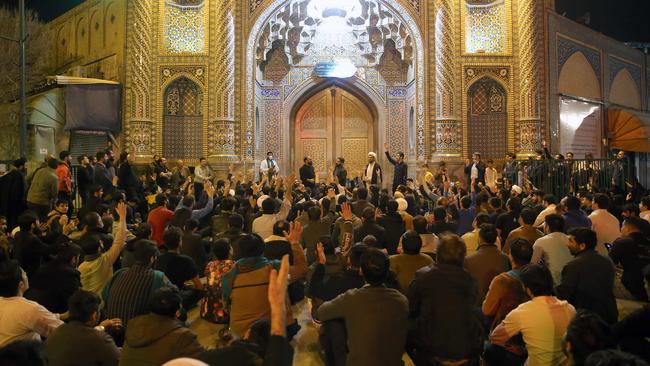Coronavirus: Worshippers clash with guards after Iranian holy sites closed
Iranian worshippers have tried to break into holy shrines and mosques, defying Iran’s leaders who are trying to bar access to religious sites.

Iranian worshippers have tried to break into holy shrines and mosques, defying Iran’s leaders who are trying to bar access to religious sites as they struggle to stem a soaring death rate caused by COVID-19.
Police in the central city of Qom apprehended 11 rioters after clashes on Monday night with mosque guards as they tried to enter one of Iran’s holiest sites, the Masoumeh shrine, the Qom prosecutor told state television. The same night in the city of Mashhad, worshippers tried to enter the largest religious site in the country, the Imam Reza shrine.
Iranian President Hassan Rouhani is trying to balance demands from some Iranians for mass quarantines with pushback from those who oppose restrictions on religious and economic activities. The tension comes as experts warn that deaths in Iran from the coronavirus could reach into the millions if public disregard for official guidelines continues. Supreme Leader Ayatollah Ali Khamenei issued a religious ruling prohibiting unnecessary travel during the outbreak.
Iran is already battling one of the world’s worst outbreaks of COVID-19. The country’s health ministry on Wednesday (AEDT) logged 135 deaths over the previous 24 hours, bringing the number of fatalities to 988. More than 16,000 people have been infected with the illness.
In a new study, cited by Iranian state media, researchers at the renowned Sharif University of Technology in Tehran said if the Iranian population began fully co-operating with advice from authorities now, the outbreak would peak in early April, leading to an estimated 12,000 deaths.
If they refused to co-operate, Iran’s strained medical system will be overwhelmed, and the peak will occur in June, causing as many as 3.5 million people to die, the study said.
While Iranian authorities say Qom is the source of its COVID-19 epidemic, they hadn’t until Tuesday restricted travel or closed religious sites in the city, which receives thousands of pilgrims every month, although local authorities had banned hotels and guesthouses from taking travellers.
Iran isn’t alone in trying to stem the tide of worshippers to holy sites. Grand Ayatollah Ali al-Sistani, the paramount spiritual authority in Iraq, who also commands loyalty among millions of Shi’ites across the world, issued a religious edict designating the fight against the coronavirus a collective duty.
Mr Sistani likened the work of medical workers to that of “heroic fighters” and said those who fell in the line of duty should be considered martyrs.
Both the Shi’ite and Sunni authorities have instructed all mosques under their authority across Iraq to be closed.
Saudi Arabia has also suspended all mass prayers, including Friday prayer, in all mosques, with the exception of the two holy mosques in Mecca and Medina.
The Wall Street Journal



To join the conversation, please log in. Don't have an account? Register
Join the conversation, you are commenting as Logout